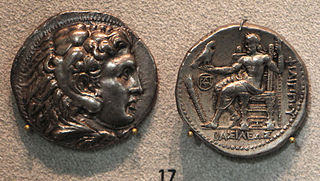See also
Topics referred to by the same term
This disambiguation page lists articles about people with the same name. If an internal link led you here, you may wish to change the link to point directly to the intended article.
Philip was the name of several Macedonian monarchs:

Macedonia, also called Macedon, was an ancient kingdom on the periphery of Archaic and Classical Greece, and later the dominant state of Hellenistic Greece. The kingdom was founded and initially ruled by the royal Argead dynasty, which was followed by the Antipatrid and Antigonid dynasties. Home to the ancient Macedonians, the earliest kingdom was centered on the northeastern part of the Greek peninsula, and bordered by Epirus to the southwest, Illyria to the northwest, Paeonia to the north, Thrace to the east and Thessaly to the south.

Philip II of Macedon was the king (basileus) of the ancient kingdom of Macedonia from 359 BC until his death in 336 BC. He was a member of the Argead dynasty, founders of the ancient kingdom, and the father of Alexander the Great.
Year 359 BC was a year of the pre-Julian Roman calendar. At the time, it was known as the Year of the Consulship of Laenas and Imperiosus. The denomination 359 BC for this year has been used since the early medieval period, when the Anno Domini calendar era became the prevalent method in Europe for naming years.
Demetrius II Aetolicus was the son of Antigonus II Gonatas and Phila who reigned as king of Macedonia from the winter of 239 to the spring of 229 BC.

Philip III Arrhidaeus reigned as king of Macedonia, an Ancient Greek Kingdom in northern Greece, from after 11 June 323 BC until his death. He was a son of King Philip II of Macedon by Philinna of Larissa, and thus an elder half-brother of Alexander the Great. Named Arrhidaeus at birth, he assumed the name Philip when he ascended to the throne.

In antiquity, Paeonia or Paionia was the land and kingdom of the Paeonians or Paionians.
Philip III may refer to:
Alexander of Macedon may refer to:
Amyntas IV was a titular king of the Greek kingdom of Macedonia in 359 BC and member of the Argead dynasty.
Ariadaeus may refer to:
Longarus was an Illyrian king of the Dardanian Kingdom. Longarus was at war with various Macedonian kings and managed to conquer at different times part of Macedonia. Longarus was an ally of the Paeonian State and liberated the Paeonians in order to open the routes towards Macedonia. Longarus' influence grew and many other Illyrians from the Ardiaean Kingdom joined him.
Audata was an Illyrian princess and wife of Philip II of Macedon.
Amyntas is the name of several prominent Greek and Hellenistic men. It later became a stock name for lovelorn shepherds in 16th-century pastoral literature. The name is derived from Greek "amyntor" meaning "defender."
Pausanias may refer to:

The Argead dynasty, also known as the Temenid dynasty, was an ancient Macedonian royal house of Dorian Greek provenance. They were the founders and the ruling dynasty of the kingdom of Macedon from about 700 to 310 BC.
Alcimachus, also known as Alcimachus of Apollonia was an Ancient Macedonian nobleman and a relative of Lysimachus.

The kingdom of Macedonia was an ancient state in what is now the Macedonian region of northern Greece, founded in the mid-7th century BC during the period of Archaic Greece and lasting until the mid-2nd century BC. Led first by the Argead dynasty of kings, Macedonia became a vassal state of the Achaemenid Empire of ancient Persia during the reigns of Amyntas I of Macedon and his son Alexander I of Macedon. The period of Achaemenid Macedonia came to an end in roughly 479 BC with the ultimate Greek victory against the second Persian invasion of Greece led by Xerxes I and the withdrawal of Persian forces from the European mainland.

The first government of ancient Macedonia was established by the Argead dynasty of Macedonian kings during the Archaic period. The early history of the ancient kingdom of Macedonia is obscure because of shortcomings in the historical record; little is known of governmental institutions before the reign of Philip II during the late Classical period. These bureaucratic organizations evolved in complexity under his successor Alexander the Great and the subsequent Antipatrid and Antigonid dynasties of Hellenistic Greece. Following the Roman victory in the Third Macedonian War over Perseus of Macedon in 168 BC, the Macedonian monarchy was abolished and replaced by four client state republics. After a brief revival of the monarchy in 150–148 BC, the Fourth Macedonian War resulted in another Roman victory and the establishment of the Roman province of Macedonia.